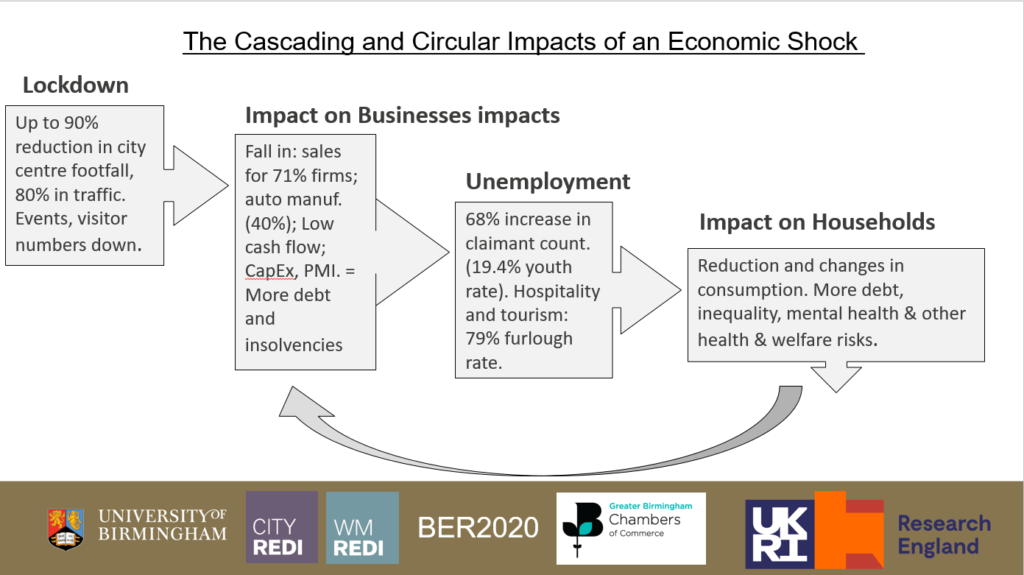This year’s Birmingham Economic Review – a collaboration between Greater Birmingham Chamber of Commerce and City-REDI / WM REDI, University of Birmingham launched yesterday at a Zoom event with over 180 attendees.
The Birmingham Economic Review is an in-depth exploration of the economy of England’s second city and a high-quality resource for informing research, policy and investment decisions.
The event began with a welcome from Professor Sir David Eastwood, Vice-Chancellor of the University of Birmingham, who highlighted the value of the review to the city-region, “I don’t think there’s been a time where the Birmingham Economic Review has been more important”.
Next, the Chair for the launch, Deborah Leary OBE, Vice President of the Greater Birmingham Chambers of Commerce talked about the purpose of the review and introduced the panellists for this year’s review:
- Professor Simon Collinson, Deputy Pro-Vice-Chancellor for Regional Engagement, Director of the West Midlands Regional Economic Development Institute (WM REDI) and City-REDI.
- Mark Thurston, Chief Executive Officer, HS2 Ltd
- Councillor Brigid Jones, Deputy Leader, Birmingham City Council
- Lynne Miles, Deputy Director, Industrial Strategy at the Department for Business, Energy and Industrial Strategy (BEIS)
Delegates then heard from City-REDI / WM REDI Director, Professor Simon Collinson who outlined the structure of the review, which looks at the period before COVID-19, the impact of the pandemic and looking beyond 2020.
Professor Collinson discussed the cascading, circular impact COVID-19 has had on the economy of Birmingham, including:
- A 90% reduction in city centre footfall and an 80% fall in traffic.
- 71% of firms reporting a fall in sales, equating to more debt and insolvencies.
- A 68% increase in the claimant count
- A reduction and changes in consumption.
 He stated that we would need precise and sectoral specific responses to recover from the impact of the pandemic and Brexit.
He stated that we would need precise and sectoral specific responses to recover from the impact of the pandemic and Brexit.
Looking to the future, Professor Collinson highlighted that the region was doing relatively well compared to other regions and that HS2 and the Commonwealth Games 2022 provide opportunities to aid the city-region’s recovery.
Professor Collinson talked about the key roles universities and partnership working can play in the region’s recovery. “Universities, such as the University of Birmingham, working with firms and Chambers of Commerce can be a catalyst for the Government’s ambition to use R&D investment to drive regional growth.” Finally, he discussed the importance to grow, develop and attract better skills to the region.
Next up was, Mark Thurston, Chief Executive Officer of HS2. Mark discussed the positive role of HS2 in Birmingham and the UK:
“Despite the pandemic, there is a lot of opportunity for the city, as we put Birmingham not just at the heart of the HS2 network, but the country’s economy.”
Whilst the Birmingham Economic Review provides a data-driven look at the economy, the next panellist, Councillor Bridget Jones, Deputy Leader of Birmingham City Council, provided delegates with examples of the social impact of COVID-19 in Birmingham.
Cllr Jones talked about a recent visit to Soho Road in Birmingham, which is usually a bustling and thriving high street and is now a ghost town, a result of COVID related restrictions. She also reminded delegates that women, minorities, low-paid frontline workers are groups that are suffering most from the economic shock from Coronavirus.
Lynne Miles, Deputy Director, Industrial Strategy at BEIS, provided delegates with an outline of what the government has been doing to aid the UK’s recovery and what it has planned in the year ahead. She stated that the government had a focus on a green recovery when we rebuild from COVID-19.
 The event ended with a Question and Answer session with our panellists. Questions included:
The event ended with a Question and Answer session with our panellists. Questions included:
- Why there is not more diversity in leadership,
- The role of anchor institutions in the region’s recovery
- The impact of the clean air zone on business.
View and download a copy of the Birmingham Economic Review 2020.
View and download a copy of Professor Simon Collison presentation from the day.
View and download an accessible version of the presentation.
This blog was written by Stuart Mitchell, Centre Manager, City-REDI / WM REDI, University of Birmingham.
Disclaimer:
The views expressed in this analysis post are those of the authors and not necessarily those of City-REDI or the University of Birmingham
